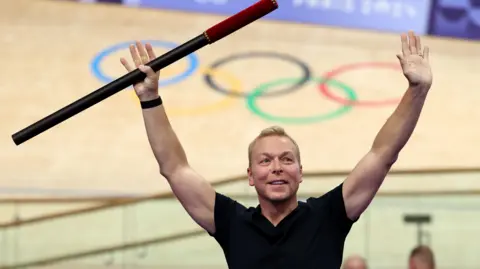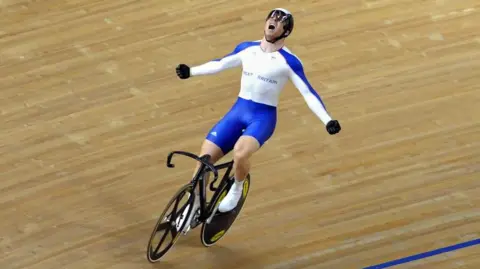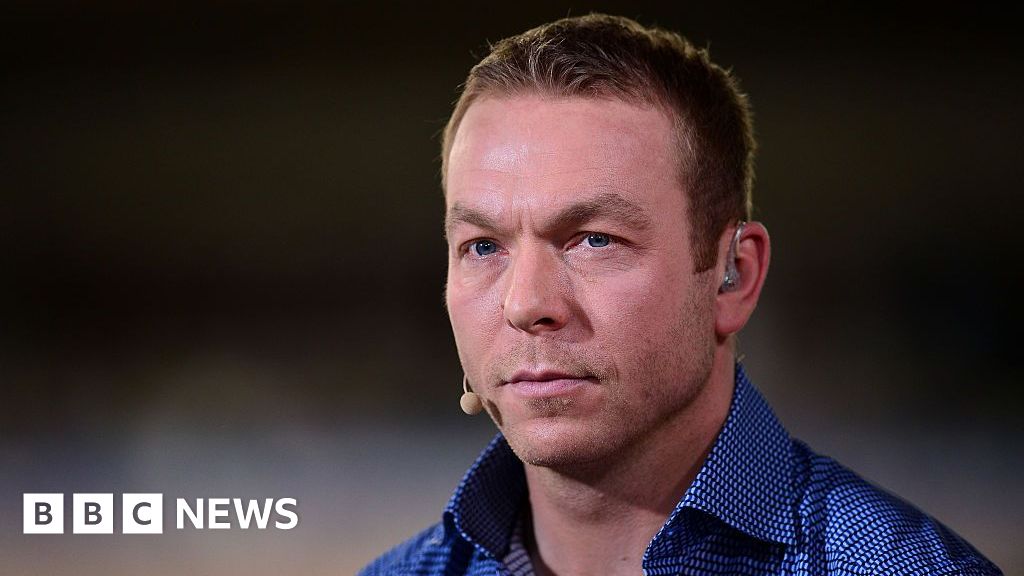 Getty Images
Getty ImagesSix-time Olympic cycling champion Sir Chris Hoy has announced that his cancer is terminal.
In an interview with the Sunday Times, he says doctors have told him he has between two and four years to live.
He told the Sunday Times that he had been diagnosed with primary cancer in his prostate, which had spread to his bones – meaning it was stage four.
Later on Sunday, the legendary athlete said on Instagram that he was “feeling fit, strong and positive”.
Health Secretary Wes Streeting told the BBC’s Laura Kuenssberg he was “in awe” of Sir Chris’s courage, positivity and “wonderful message of hope”, adding that the “whole nation will be cheering him on now” and sending love.
The 48-year-old Scot revealed earlier this year that he had been diagnosed with cancer. He had not previously disclosed the type of cancer.
Sir Chris won six Olympic golds between 2004 and 2012 – the second highest total by any British Olympian behind Sir Jason Kenny’s tally of seven.
He retired from cycling in 2013 and in recent years has been a regular pundit and commentator as part of BBC Sport’s cycling coverage.
Sir Chris told the newspaper he has known for a year that his cancer is terminal.
Tumours were discovered to his shoulder, pelvis, hip, spine and rib.
Sir Chris told the newspaper: “As unnatural as it feels, this is nature.
“You know, we were all born and we all die, and this is just part of the process.
“You remind yourself, aren’t I lucky that there is medicine I can take that will fend this off for as long as possible.”
Sir Chris added: “Hand on heart, I’m pretty positive most of the time and I have genuine happiness. This is bigger than the Olympics. It’s bigger than anything. This is about appreciating life and finding joy.”
After the Sunday Times article was published, he posted a message on Instagram saying: “You may see in the news this weekend some articles about my health, so I just wanted to reassure you all that I’m feeling fit, strong and positive, and overwhelmed by all the love and support shown to my family and me. Onwards!”
There were many supportive comments and good wishes underneath the post, including from fellow former Olympic cyclist Mark Cavendish who called Sir Chris a “hero of a human being”.
Olympic athlete Dame Kelly Holmes also commented “sending love to you Chris” and the British Cycling account left an emoji showing two hands making a heart symbol.
Speaking on the Sunday with Laura Kuenssberg programme, Streeting added that Sir Chris was “not the only person” dealing with a terminal cancer diagnosis, so had “done the country such an enormous service” by being open and positive.
“That’s worth even more than the stack of Olympic gold that he’s built up over his career,” he continued.
Streeting was diagnosed with cancer in 2021, aged 38, and had an operation to remove a kidney as part of his treatment. He announced he was cancer free later that year.
 PA
PAThe Olympian’s cancer was discovered last year after a routine scan for shoulder pain – he thought he had injured himself while lifting weights at the gym – revealed a tumour.
The athlete was with his wife Sarra when he was given his terminal diagnosis. The couple have two children, Callum and Chloe, who were aged nine and six at the time.
Just before Sir Chris’s tumour was discovered, Sarra had undergone scans that would later show she had multiple sclerosis, a degenerative disease.
Scotland’s first minister John Swinney called Sir Chris “a person of incredible courage”, sending him good wishes in an X post.
Edinburgh-born Sir Chris, who was first inspired to take up cycling by the famous BMX scenes in the film E.T., had won six Olympic, 11 world and 43 World Cup titles by the time he retired.
The cyclist first won gold at the Athens Olympics in 2004, and went on to secure three more gold medals four years later in 2008 Beijing. He won two further golds in London 2012.
Such was his prestige that he was chosen to be the flag bearer for Team GB at the closing ceremony of the 2008 Olympics and then again at the opening ceremony for the London Olympics four years later.
A stadium built in Glasgow for the 2014 Commonwealth Games was named in his honour.
Talking to Stephen Nolan on BBC Radio 5 Live, Simon Richardson, editor of Cycling Weekly magazine, called Sir Chris “the epitome of the Olympic champion”.
Michael Hutchinson, a journalist and former professional cyclist, echoed that, calling the Olympic champion a “talisman” in an interview on 5 Live Breakfast.
He added it was “inspiring” that Sir Chris had not showed “an ounce of self-pity” in announcing his diagnosis.
Since retiring, Sir Chris has written several books for children alongside his contribution to BBC cycling coverage.
He has also been writing a memoir for the last year, which is due to be published next month.
This week he has been appearing on BBC Two, co-presenting the coverage of the World Track Championships with Jill Douglas in Denmark.


